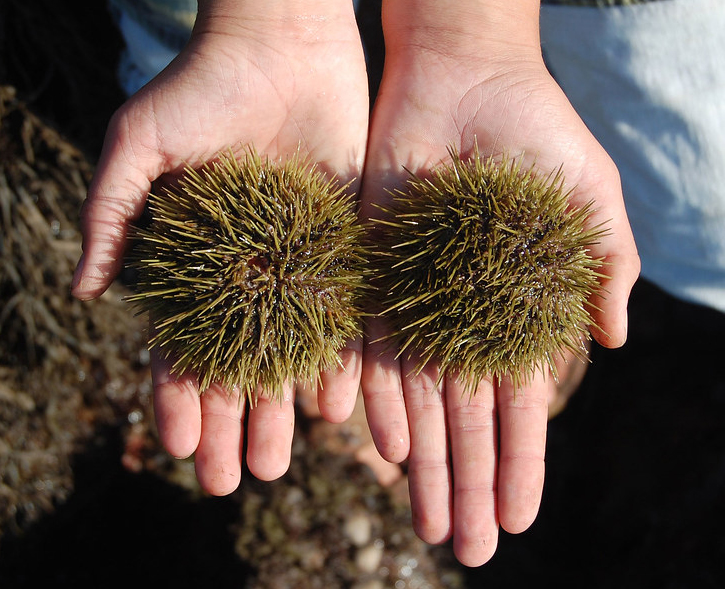Sea Urchin
Species Description
Green sea urchin Strongylocentrotus droebachiensis
also known as uni
Wild.
Green sea urchins are marine invertebrates belonging to the Echinoderm family, which also includes starfish, sea cucumbers, brittle stars, and sea lilies. Recognizable by their short, dense spines, urchins use these spines for protection and movement along the ocean floor.
They possess a specialized feeding structure known as Aristotle’s lantern, which allows them to scrape algae from rocks. Inside, sea urchins contain five edible, golden-yellow reproductive lobes, commonly called “uni”.
Green sea urchins are found in shallow, rocky subtidal zones, where they graze on kelp, algae, and small invertebrates.
Season
Harvesting seasons vary year to year. Check in with Maine Department of Marine Resources (DMR) for information on the most up-to-date fishing calendar.
Status
Maine’s sea urchin fishery underwent a dramatic boom-and-bust cycle in the 1990s, driven by surging global demand. While the fishery has stabilized in recent years, green sea urchin populations remain overfished,’particularly in the waters off western Maine. Some recovery has been observed in the eastern part of the state, but overall stock levels are still a concern.
To protect the resource, the fishery continues to be tightly regulated, with limited harvest days, size restrictions, and strict licensing rules.
Regulatory Authority
Maine Department of Marine Resources.
Harvest Method
Fishermen collect urchins by diving, and with drags to scoop urchins off the seafloor. See the vessel and gear guide for more information.
Recreational Harvest
Harvested urchins must measure at least 2 1/16 inches and no more than 3 inches in their longest shell diameter, exclusive of the spines.
It is unlawful to harvest sea urchins between sunset and sunrise; harvesting is permitted only during daylight hours.
Health Benefits & Risks
Sea urchin is a low-calorie source of protein and omega-3s, and contains some fat and cholesterol. Confirm freshness and storage conditions if purchased frozen or preserved.
View the 2021 US Food and Drug Administration’s fish consumption guidelines.
Buying & Preparing
Sea urchin roe, or uni, is a delicacy known for its sweet, ocean-like flavor and buttery texture. High-quality uni shines bright yellow, gold, or orange and is often served fresh and uncooked. It’s also used to enhance soups, custards, and other seafood dishes.
When buying uni, look for fresh, brightly colored roe without dullness, discoloration, or graininess. Avoid any with a watery appearance or bitter taste, which indicates poor quality. Some packaged uni may be soaked in an alum-salt solution to maintain freshness.
Try serving fresh uni atop sushi rice as nigiri, or gently fold it into creamy pasta with garlic, lemon, and fresh herbs for a luxurious seafood dish.
Certifications & Verifications
Links
- Maine Department of Marine Resources Sea Urchin Page
- The Green Sea Urchin in Maine, Fishery and Biology – a general summary by Stanley Chenoweth, DMR
- The Sea Urchin Fishery
- Green Sea Urchin Aquaculture, Maine Sea Grant
- Green Sea Urchin Fast Facts

